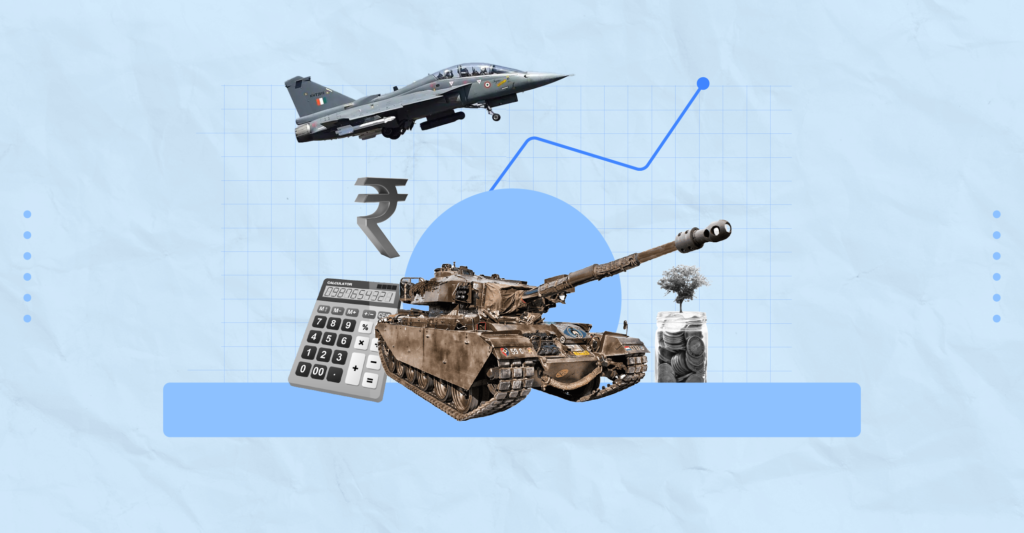Last Updated on Dec 5, 2024 by KraftPixel
The defence industry plays a crucial role in safeguarding nations by producing and maintaining military equipment. India’s focus on reducing foreign dependence and promoting indigenous production, led by initiatives like “Atmanirbhar Bharat” and the Defence Research and Development Organisation (DRDO), has boosted the growth of domestic defence companies. This shift has opened opportunities for those exploring defence stocks in India. In this article, you will discover the best defence stocks in India, features, types, factors to consider before investing, how to identify and invest in them, and more.
Table of Contents
Best Defence Stocks in India (2024)
| Name | Market Cap (in Cr.) | Close Price (Rs.) | PE Ratio | 1Y Return (%) | 5Y CAGR (%) | Net Income (Q) (Rs. in cr.) |
| Hindustan Aeronautics Ltd | 2,85,028.56 | 4,261.95 | 37.40 | 120.28 | 61.21 | 7621.05 |
| Sika Interplant Systems Ltd | 1,082.67 | 2,553.35 | 55.92 | 115.62 | 68.37 | 19.36 |
| Bharat Dynamics Ltd | 37,838.41 | 1,032.25 | 61.75 | 98.40 | 44.96 | 612.72 |
| Taneja Aerospace and Aviation Ltd | 1,068.09 | 418.85 | 95.96 | 61.13 | 79.38 | 11.13 |
| Paras Defence and Space Technologies Ltd | 4,193.16 | 1,040.65 | 130.79 | 45.02 | 32.06 | |
| TechEra Engineering Ltd | 305.72 | 185.05 | 63.17 | 40.99 | 4.84 | |
| Data Patterns (India) Ltd | 13,210.54 | 2,359.70 | 72.71 | 20.59 | 181.69 | |
| High Energy Batteries (India) Ltd | 575.93 | 647.90 | 33.56 | 4.32 | 71.28 | 17.16 |
| ideaForge Technology Ltd | 2,442.40 | 567.60 | 53.94 | -32.16 | 45.28 | |
| Aavas Financiers Ltd |
Note: The data is as of 6th November 2024. The defence stocks list with price is derived from using Tickertape Stock Screener. The parameters used are as follows:
- Sector: Industrials > Aerospace and Defence Equipment
- 1Y Returns: Sorted from high to low
- 5Y CAGR
- Net Income (Q)
🚀 Pro Tip: Use Tickertape’s Portfolio Analysis to assess your investment portfolio’s diversification and performance.
Confused About Which Defence Stocks to Pick? Consider these smallcases.
1. Quantance Defence Stars smallcase: This smallcase, managed by Quantance Research, is a concentrated treasure basket of 3-15 stocks selected from NIFTY Defence Universe.
2. smartvalues – defense smallcase: This smallcase, managed by Lamron Analysts, is a portfolio of five stocks from the defence sector.
- Disclosure for the Quantace Defence Stars smallcase.
- Disclosure for the smartvalues-defense smallcase.
Overview of the Top 10 Defence Stocks in India
Hindustan Aeronautics Ltd (HAL)
Known for its significant role in India’s aerospace and defence manufacturing, HAL produces a variety of aircraft, helicopters, and engines, catering to the defence and civil sectors. Over the last five years, HAL’s revenue has grown at an impressive yearly rate of 9.65%, outperforming the industry average of 8.49%. Additionally, its net income has surged at a yearly rate of 26.76%, well above the industry average of 24.96%.
Sika Interplant Systems Ltd
Specialising in aerospace engineering and support systems, Sika Interplant is involved in both design and manufacturing, serving defence and aviation clients. The company’s revenue has shown robust growth at a yearly rate of 19.34% over the last five years, far exceeding the industry average of 8.49%. Moreover, its debt-to-equity ratio stands at a mere 0.3%, significantly lower than the industry average of 8.2%.
Bharat Dynamics Ltd (BDL)
A leading manufacturer of missiles and defence equipment, Bharat Dynamics plays a crucial role in India’s defence sector. It has projected revenue growth of 15.70% for the coming year, which is above its three-year CAGR of 10.79%. Additionally, its debt-to-equity ratio has averaged 0.36% over the past five years, considerably below the industry’s 8.2%.
Taneja Aerospace and Aviation Ltd
This company focuses on manufacturing and servicing aircraft components and offers specialised aviation services. Taneja Aerospace has maintained a debt-to-equity ratio of 6.25% over the last five years, compared to the industry’s 8.2%, and it has a strong net profit margin of 36.07%.
Paras Defence and Space Technologies Ltd
A key player in defence and space equipment manufacturing, Paras Defence supports India’s space and defence missions with advanced technologies. Over the last five years, its revenue has grown annually at 10.74%, above the industry average of 8.49%. Its market share has also increased from 0.65% to 0.72% over this period.
TechEra Engineering Ltd
Operating in the engineering sector, TechEra Engineering provides specialised services in high-technology areas. It maintains a net profit margin of 12.38% and a strong return on equity (ROE) of 35.88%, indicating solid profitability and operational efficiency.
Data Patterns (India) Ltd
Known for its electronics solutions in defence and aerospace, Data Patterns has rapidly expanded its capabilities in recent years. Its revenue has grown at an impressive yearly rate of 33.69% over the last five years, versus the industry average of 8.49%, and net income has soared at an astounding 88.23% annually, well above the industry average of 24.96%.
High Energy Batteries (India) Ltd
This company specialises in manufacturing high-performance batteries for defence and aerospace applications. Over the past five years, its revenue has grown annually at 11.79%, outperforming the industry average of 8.49%. The company has also seen its net income rise by a staggering 109.03% per year, far surpassing the industry average of 24.96%.
ideaForge Technology Ltd
A leader in drone technology, ideaForge is recognised for developing high-performance UAVs catering to defence and surveillance needs. The company’s current ratio has been an impressive 457.2% over the last five years, compared to the industry average of 167.26%, and it has a net profit margin of 13.15%.
Aavas Financiers Ltd
As a prominent player in housing finance, Aavas Financiers primarily serves the affordable housing segment. Over the last five years, the company’s revenue has grown at a remarkable yearly rate of 23.23%, significantly higher than the industry average of 1.6%. Its debt-to-equity ratio has been maintained at 287.73%, which is notably lower than the industry average of 418.29%.
What are Defence Stocks?
The defence industry is more connected to you than you might realise. Think about the technology and engineering that go into military equipment and infrastructure. This industry is responsible for creating, designing, and maintaining everything from weapons and vehicles to military bases and communication systems. Defence stocks are shares of companies involved in the design, development, and manufacture of military systems and products. These companies play a crucial role in providing the necessary technology, equipment, and services to a nation’s armed forces.
Overview of the Defence Industry in India
The Indian defence sector’s three largest market segments are military fixed-wing aircraft, naval vessels and surface combatants, and missile and missile defence systems. As a key economic sector, India’s defence manufacturing industry is expected to grow rapidly, driven by heightened national security concerns. The demand for defence equipment has been increasing due to ongoing border disputes with Pakistan and China over Kashmir and Arunachal Pradesh, respectively. In recent years, India has been among the leading importers of defence equipment to enhance its technological edge against rivals like China and Pakistan.
To modernise its armed forces and reduce reliance on foreign defence procurement, the Indian government has launched several policy initiatives promoting ‘Make in India’ for defence manufacturing. India’s defence sector is the fourth largest globally, with a budget allocation of USD 74.7 billion in 2024. This considerable investment underscores India’s commitment to enhancing national security and modernising its armed forces.
By investing in defence stocks, you may gain exposure to a sector that is often considered critical to national security and economic stability. Whether it’s defence PSU stocks or private players, these shares are integral to the security framework. Overall, investing in defence stocks can offer you a way to be part of a vital industry that supports national security and technological advancement.
Features of Defence Stocks
- Government Contracts: A significant portion of the revenue for defence stocks in India may come from government contracts. These contracts can be long-term, providing a stable source of income, making them appealing in defence stocks’ price gain analysis.
- Technological Advancements: The Indian defence sector stocks are often at the forefront of technological innovation, creating advanced systems and equipment for military use, which affects defence stocks share price.
- Regulatory Environment: The defence sector is heavily regulated, with stringent compliance requirements that can impact the operations and profitability of companies. These compliance factors are significant when considering defence stocks to buy.
- Global Demand: There is a consistent global demand for defence products and services, driven by geopolitical tensions and the need for national security.
Types of Defence Companies
- Public Sector Undertakings (PSUs): In India, several defence companies are government-owned and are integral to the nation’s defence infrastructure. These PSUs play a critical role in developing and maintaining military capabilities.
- Private Sector Companies: The Indian government has been encouraging private sector participation in defence manufacturing. Many private firms are making significant strides in contributing to the defence sector’s growth and innovation.
Factors to Consider When Choosing Defence Sector Stocks
When you are considering investing in defence shares in India, it is important to evaluate several factors to make an informed decision. The defence industry, given its critical role in national security and technological advancements, presents unique investment opportunities and risks. Here are some key factors to consider:
Financial Performance and Stability
This includes examining revenue growth, profit margins, debt levels, and cash flow of defence companies. A company with strong financials might indicate the ability to withstand market fluctuations and continue investing in innovation and expansion.
Government Contracts and Policies
Defence sector shares often rely heavily on government contracts, which can be a stable source of revenue. Additionally, government policies promoting domestic defence production, such as India’s “Atmanirbhar Bharat,” can significantly impact the growth potential of defence sector stocks in India.
Technological Innovation
Companies that invest in research and development to create cutting-edge technologies and systems may have a competitive advantage. Assessing defence stocks for their innovation capabilities provides insights into long-term growth, relevant to defence stocks price gain analysis.
Geopolitical Environment
The geopolitical climate can have a significant impact on defence sector stocks in India. Tensions or conflicts can lead to governments’ increased defence spending, potentially benefiting defence companies. Conversely, periods of stability may reduce budgets, affecting why defence stocks are falling or rising.
Diversification and Market Reach
Companies with a diversified portfolio of products and services, as well as a broad market reach, might be better positioned to handle market fluctuations. Evaluating the range of products and geographical markets a company serves can provide a clearer picture of its growth potential, which is useful for a defence share list comparison.
Regulatory Compliance
The defence sector is subject to stringent regulations. Ensuring that a company complies with these regulations is critical to avoiding potential legal and operational risks. Researching the regulatory landscape and assessing a company’s adherence to these standards is important for determining defence stocks to buy.
Industry Position and Competition
Understanding a company’s position within the industry and its competitive landscape can provide insights into its market strength. Leading companies with a significant market share and strong competitive positioning may offer more stable investment opportunities.
How to Identify the Best Defence Stocks in India?
Identifying the best defence stocks in India involves thorough research and analysis. Here are some steps you can follow to make an informed decision:
Utilise Tickertape Stock Screener
Tickertape is a comprehensive stock analysis platform that provides valuable insights into various stocks, including those in the defence sector. You can use the Tickertape Stock Screener to filter and identify the best defence stocks in India based on multiple parameters such as financial performance, market capitalisation, and more.
- Financial Performance: Check the revenue growth, profit margins, and debt levels of defence companies. Strong financials may indicate the company’s ability to withstand market fluctuations and continue investing in innovation.
- Valuation Ratios: Use valuation metrics like the Price-to-Earnings (P/E) ratio, Price-to-Book (P/B) ratio, and Price-to-Sales (P/S) ratio to compare companies within the defence sector. These ratios can help you determine if a stock is undervalued or overvalued compared to its peers.
- Dividend Yield: Some investors prefer stocks that offer regular dividends. You can screen for defence companies that have a history of paying dividends, which might provide a steady income stream.
- Growth Prospects: Evaluate the future growth potential of the companies by analysing their investment in research and development, new product launches, and expansion plans. Companies with strong growth prospects can offer substantial returns over the long term.
Analyse Industry Trends
Staying updated on industry trends and government policies can provide a broader perspective on the defence sector’s future. Factors like increased defence spending, government initiatives to promote indigenous production, and geopolitical tensions can influence the performance of defence stocks.
Research and Reports
Leverage research reports and expert analyses are available on platforms like Tickertape. These reports provide in-depth insights into the performance and potential of various defence stocks, helping you make an informed decision.
How to Invest in the Best Defence Stocks in India?
Investing in the best defence stocks in India can be a rewarding strategy if done correctly. Here is a step-by-step guide to help you invest using Tickertape:
Step 1: Create an Account on Tickertape
Start by creating an account on the Tickertape platform. This will give you access to a wide range of tools and resources to analyse and track defence stocks.
Step 2: Use the Stock Screener
Utilise the Tickertape Stock Screener to filter defence stocks based on various criteria such as financial performance, valuation ratios, dividend yield, and growth prospects. The screener allows you to customise your search parameters to identify the stocks that best fit your investment goals. You can easily get a defence shares list in India.
Step 3: Analyse Selected Stocks
Once you have a list of potential stocks, delve deeper into each one. Review financial reports, industry trends, and expert analyses available on Tickertape. Pay attention to key metrics and company news that might impact stock performance.
Step 4: Create a Diversified Portfolio
Diversification can help mitigate risks associated with investing in a single sector. Consider spreading your investments across multiple defence stocks and other sectors to balance your portfolio.
Step 5: Monitor Your Investments
Regularly monitor the performance of your investments using Tickertape’s portfolio tracking tools. Stay informed about market trends, company developments, and any changes in government policies that might affect the defence sector.
Step 6: Review and Rebalance
You may periodically review your portfolio and make necessary adjustments to maintain your desired asset allocation. Rebalancing might help ensure that your portfolio remains aligned with your investment objectives.
Benefits of Investing in the Best Defence Companies in India
Investing in the best defence companies in India can offer several potential benefits:
Steady Revenue Stream
Defence companies often secure long-term contracts with the government, providing a stable and predictable revenue stream. This stability may help buffer the companies against economic downturns and market volatility.
Technological Advancements
Defence companies are typically at the forefront of technological innovation. By investing in these companies, you can gain exposure to cutting-edge technologies and developments in the fields of aerospace, cybersecurity, and advanced weaponry.
Government Support
The Indian government’s emphasis on self-reliance and indigenous production, under initiatives like “Atmanirbhar Bharat,” provides significant support to the domestic defence sector. Policies aimed at reducing dependence on foreign imports can boost the growth of Indian defence companies.
Strong Market Demand
The ongoing need for national security and defence spending creates consistent demand for defence products and services. This demand is not only driven by domestic needs but also by international markets, as countries continually invest in their military capabilities.
Diversification
Investing in defence stocks can diversify your investment portfolio. The defence sector often operates independently of other sectors, which may help reduce overall portfolio risk.
Risks Associated with Defence Stocks
While investing in Indian defence stocks can be lucrative, there are several risks that you should consider:
Dependency on Government Contracts
A significant portion of defence companies’ revenue comes from government contracts. Changes in government policies, budget cuts, or shifts in political priorities can impact these contracts and, consequently, the company’s financial health.
Regulatory Challenges
The defence sector is heavily regulated, and companies must comply with stringent laws and regulations. Any non-compliance or changes in regulatory frameworks can result in fines, legal issues, or operational disruptions.
Geopolitical Risks
Defence companies are highly sensitive to geopolitical events. While increased tensions can boost demand for defence products, prolonged conflicts or political instability can have negative impacts, including disruptions in supply chains or changes in trade policies.
Technological Obsolescence
The rapid pace of technological advancements in the defence sector means that companies must continually invest in research and development to stay competitive. Failure to innovate can lead to technological obsolescence and loss of market share.
High Capital Expenditure
Defence companies often require significant capital expenditure to develop new technologies and maintain existing infrastructure. High capital costs can impact profitability and cash flow, particularly if anticipated contracts do not materialise.
Who Should Invest in the Defence Companies in India?
Investing in the best defence companies in India might be suitable for certain types of investors who align with specific investment goals and risk profiles. Here are some profiles that might find investing in defence companies beneficial:
Long-term Investors
If you are a long-term investor, you may find Indian defence stocks attractive due to their potential for steady growth over time. The defence sector often involves long-term contracts and consistent government support, which can contribute to sustained revenue and profitability.
Risk-tolerant Investors
The defence industry can be volatile due to its sensitivity to geopolitical events and regulatory changes. If you have a higher risk tolerance and can withstand market fluctuations, you might benefit from the potential high returns that defence stocks can offer.
Technology Enthusiasts
Investors who have a keen interest in technological advancements might find the defence sector appealing. Defence companies are often at the forefront of innovation, working on cutting-edge technologies in aerospace, cybersecurity, and advanced weaponry.
Portfolio Diversifiers
If you are looking to diversify your investment portfolio, adding even small cap defence stocks in India can provide exposure to a sector that often operates independently of traditional economic cycles. This diversification can help mitigate overall portfolio risk.
Supporters of Indigenous Production
If you believe in supporting domestic industries and reducing reliance on foreign imports, investing in Indian defence companies aligns with the “Atmanirbhar Bharat” initiative. This can be both a financial and ideological investment, supporting national self-reliance.
To Conclude
Investing in the top defence stocks in India can offer significant potential benefits, including stable revenue from long-term government contracts, exposure to technological advancements, and diversification for your investment portfolio. The Indian government’s focus on promoting self-reliance and indigenous production under initiatives like “Atmanirbhar Bharat” further strengthens the growth prospects of the defence sector. While there are risks associated with regulatory changes and geopolitical factors, the consistent demand for defence capabilities and the push for increased defence exports present promising opportunities.
Using tools like Tickertape, you can carefully analyse and select the best defence stocks. Tickertape’s Stock Screener allows you to filter and compare stocks based on various financial metrics, helping you make informed investment decisions. By leveraging such platforms, you may position yourself to take advantage of the sector’s growth and innovation.
Frequently Asked Questions on Defence Stocks in India
What are the best defence stocks in India?
Several companies are in the defence sector. Visit Tickertape and follow the steps below to find the best defence stocks in India.
– Launch the Stock Screener
– Select ‘Aerospace and Defence Equipments’ under ‘Sector’
Now sort the stock according to your preferred parameters like market cap, 5-yr CAGR, net profit, return on equity, etc.
What is the list of defence stocks on the NSE?
There are several defence sector companies listed on the NSE. Use Tickertape to get the list of defence stocks on NSE.
– Launch Tickertape Stock Screener
– Select ‘Aerospace and Defence Equipments’ under ‘Sector’
You can sort these stocks according to your preferred parameters like market cap, 5-yr CAGR, net profit, return on equity, etc.
Which is the top-performing defence sector stock in India?
On the basis of 1Y return performance, Sika Interplant Systems Ltd has been the best-performing defence stock in India in the past year.
How can I identify the top defence stocks in India?
To identify the best defence stocks, analyse financial reports, monitor government contracts, and stay updated on political developments influencing the defence sector.
What risks are associated with investing in defence stocks?
Investing in defence stocks carries risks such as budget constraints, regulatory changes, and geopolitical tensions affecting defence budgets. Mitigate these risks through thorough research and diversification.
Do defence shares typically offer dividends?
Dividend payouts are not limited to specific sectors, including defence. This depends on the company’s financial performance. With many defence companies have recorded net profit in the past, it is quite possible for defence companies to announce dividends. It is advisable to check the dividend history of specific defence shares before investing.
Can defence sector stocks be considered as a long-term investment in India?
With increased allocation of budget and government’s mission to produce defence equipment in India, the defence sector stocks have received major boost. As a result, many defence sector stocks have made a double-digit return in the past year.
Explore other popular stock collections on Tickertape –
Here’s are some of the popular stock collections across different sectors in India:
- Best Mutual Funds for Passive Investors (2025) - Dec 9, 2024
- List of Stocks With RSI Below 30 in India - Dec 9, 2024
- 10 Highest Dividend Paying Stocks in Nifty 50 NSE India - Dec 9, 2024




